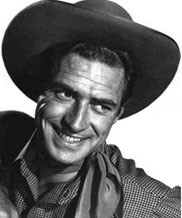 JOCK MAHONEY JOCK MAHONEY
Ratings: Zero to 4 Stars.
Jock (aka Jack, Jacques, Jocko) Mahoney (aka O’Mahoney) started as a stuntman in the mid ‘40s and quickly became Charles Starrett’s double in the Durango Kid Columbias. He graduated to featured roles in these Starretts, then serial stardom. When his Columbia contract ended Gene Autry hired Jocko as the “Range Rider” for 78 episodes (12/50-6/53).
 HOEDOWN (‘50 Columbia) Funny, bright, witty, thoroughly enjoyable. The HOEDOWN (‘50 Columbia) Funny, bright, witty, thoroughly enjoyable. The 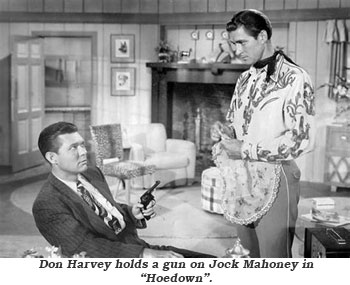 funniest spoof of Westerns you’ll ever see as broken-down, naïve ex-cowboy star Jocko Mahoney (as Stoney Rhodes) tries to raise the money to pay his mother’s mortgage. Jocko is an absolute delight as he hooks up with world-wise reporter Jeff Donnell only to discover the latest residents of Eddy Arnold’s singing dude ranch are really bank robbers. Country singer Eddy Arnold is top billed, but it’s Mahoney’s show all the way. Arnold’s billing is just an excuse for him to sing his hits “Big Bouquet of Roses” and “Just a Little Lovin’”. His agent at the time was Colonel Tom Parker who later managed Elvis Presley. Jocko “sings” in his movie within a movie, “Bang ‘Em Up Buckaroo”, but it’s really Gene Autry’s voice. When Jocko really sings, “Froggy Went a Courtin’”, you’ll howl. There’s also a cute scene when Jocko talks to a Gene Autry “Strawberry Roan” poster. Yodelin’ Carolina Cotton is along for the merriment as is Big Boy Williams as Arnold’s friend. funniest spoof of Westerns you’ll ever see as broken-down, naïve ex-cowboy star Jocko Mahoney (as Stoney Rhodes) tries to raise the money to pay his mother’s mortgage. Jocko is an absolute delight as he hooks up with world-wise reporter Jeff Donnell only to discover the latest residents of Eddy Arnold’s singing dude ranch are really bank robbers. Country singer Eddy Arnold is top billed, but it’s Mahoney’s show all the way. Arnold’s billing is just an excuse for him to sing his hits “Big Bouquet of Roses” and “Just a Little Lovin’”. His agent at the time was Colonel Tom Parker who later managed Elvis Presley. Jocko “sings” in his movie within a movie, “Bang ‘Em Up Buckaroo”, but it’s really Gene Autry’s voice. When Jocko really sings, “Froggy Went a Courtin’”, you’ll howl. There’s also a cute scene when Jocko talks to a Gene Autry “Strawberry Roan” poster. Yodelin’ Carolina Cotton is along for the merriment as is Big Boy Williams as Arnold’s friend.
 KANGAROO KID (‘50 Eagle Lion) American cowboy detective Jock Mahoney is sent down under to Australia to find and extradite a wanted man. Undercover, Jock becomes a stage driver for a gold mine, but when he’s held up, he’s blamed for the robbery. This Australian Western is a novelty, nothing more, wasting Jocko’s athletic abilities on only one bar fight. KANGAROO KID (‘50 Eagle Lion) American cowboy detective Jock Mahoney is sent down under to Australia to find and extradite a wanted man. Undercover, Jock becomes a stage driver for a gold mine, but when he’s held up, he’s blamed for the robbery. This Australian Western is a novelty, nothing more, wasting Jocko’s athletic abilities on only one bar fight.
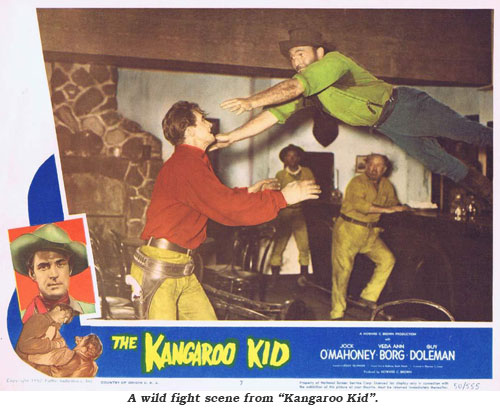
  CODY OF THE PONY EXPRESS (‘50 Columbia 15 chapter serial) Mediocre Sam Katzman Columbia serial suffers from under utilization of Jock O’Mahoney (he performs hardly any stunts and few fights), sloppy scripting, plot inconsistencies galore and weak chapter endings/resolutions. Army Lieut. O’Mahoney is assigned as an undercover investigator to bring to justice a band of outlaws headed by rotten attorney George J. Lewis. Jocko is aided by young pony rider, Bill Cody (Dickie Moore), to whom all the real action and chapter endings fall. Also helping Jocko and Dickie are Peggy Stewart, Tom London, William Fawcett. Directed by serial ace Spencer Gordon Bennet—on several of his off days. CODY OF THE PONY EXPRESS (‘50 Columbia 15 chapter serial) Mediocre Sam Katzman Columbia serial suffers from under utilization of Jock O’Mahoney (he performs hardly any stunts and few fights), sloppy scripting, plot inconsistencies galore and weak chapter endings/resolutions. Army Lieut. O’Mahoney is assigned as an undercover investigator to bring to justice a band of outlaws headed by rotten attorney George J. Lewis. Jocko is aided by young pony rider, Bill Cody (Dickie Moore), to whom all the real action and chapter endings fall. Also helping Jocko and Dickie are Peggy Stewart, Tom London, William Fawcett. Directed by serial ace Spencer Gordon Bennet—on several of his off days.
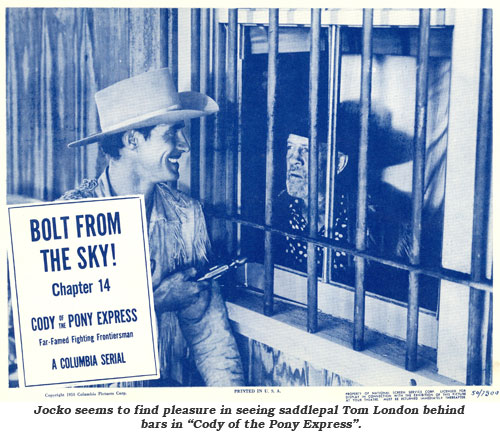
   ROAR OF THE IRON HORSE (‘51 Columbia 15 chapter serial) Building the transcontinental railroad, chief engineer Hal Landon, his sister Virginia Herrick and superintendent Jack Ingram are besieged from every side by outlaws led by a mystery boss who is—well we won’t spoil it for you; construction problems stirred up by foreman Rusty Wescoatt; Indians, and obstinate, huge landowner The Baron (George Eldredge) and his henchies. Special agent Jocko, dispatched from Washington to investigate, enlists the aid of grizzled old timer William Fawcett and young Indian chief Rick Vallin to battle all these menaces. As in most Columbia serials, there are various factions working against and double-crossing one another—as well as enough plot inconsistencies to run the railroad through. However, producer Sam Katzman’s “Iron Horse” really roars in the capable directorial hands of serial vets Spence Bennet and Tommy Carr, with enough well staged action to sustain the excitement for 15 chapters—especially allowing Jocko stunt after stunt and an abundance of fights. Also thank Katzman for loosening the purse strings to get away from the usual Hollywood western locations and film “Roar…” in the Carson City, NV, area. ROAR OF THE IRON HORSE (‘51 Columbia 15 chapter serial) Building the transcontinental railroad, chief engineer Hal Landon, his sister Virginia Herrick and superintendent Jack Ingram are besieged from every side by outlaws led by a mystery boss who is—well we won’t spoil it for you; construction problems stirred up by foreman Rusty Wescoatt; Indians, and obstinate, huge landowner The Baron (George Eldredge) and his henchies. Special agent Jocko, dispatched from Washington to investigate, enlists the aid of grizzled old timer William Fawcett and young Indian chief Rick Vallin to battle all these menaces. As in most Columbia serials, there are various factions working against and double-crossing one another—as well as enough plot inconsistencies to run the railroad through. However, producer Sam Katzman’s “Iron Horse” really roars in the capable directorial hands of serial vets Spence Bennet and Tommy Carr, with enough well staged action to sustain the excitement for 15 chapters—especially allowing Jocko stunt after stunt and an abundance of fights. Also thank Katzman for loosening the purse strings to get away from the usual Hollywood western locations and film “Roar…” in the Carson City, NV, area.
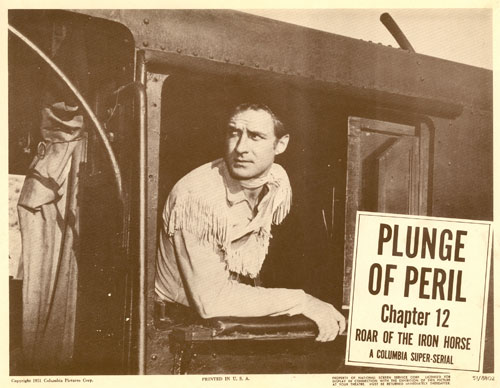
  GUNFIGHTERS OF THE NORTHWEST (‘54 Columbia 15 Ch. Serial) A band of outlaws known as The White Horse Rebels, led by a masked leader (obvious from the get-go to any serious serial watcher as Don Harvey, the supposedly innocuous trading post owner) plan to take over the territory and establish the White Horse Republic. In 15 chapters of continuous action, directed by Spencer Bennet and Charles S. Gould, Mounties Jack (Jocko) Mahoney and Clayton Moore battle The Leader and his gang. Phyllis Coates, believed at first to be a member of the White Horse Rebels, is actually after her brother’s killer. One interesting point in Ch. 1 has both Lone Rangers—Clayton Moore and John Hart—in a scene together. As usual with Katzman’s serials, the plot holds up fairly well in the early chapters, but the usual Katzman plot inconsistencies start to appear after Ch. 12 or so, as if pages were torn out of the script in a hurry to cut the budget. GUNFIGHTERS OF THE NORTHWEST (‘54 Columbia 15 Ch. Serial) A band of outlaws known as The White Horse Rebels, led by a masked leader (obvious from the get-go to any serious serial watcher as Don Harvey, the supposedly innocuous trading post owner) plan to take over the territory and establish the White Horse Republic. In 15 chapters of continuous action, directed by Spencer Bennet and Charles S. Gould, Mounties Jack (Jocko) Mahoney and Clayton Moore battle The Leader and his gang. Phyllis Coates, believed at first to be a member of the White Horse Rebels, is actually after her brother’s killer. One interesting point in Ch. 1 has both Lone Rangers—Clayton Moore and John Hart—in a scene together. As usual with Katzman’s serials, the plot holds up fairly well in the early chapters, but the usual Katzman plot inconsistencies start to appear after Ch. 12 or so, as if pages were torn out of the script in a hurry to cut the budget.
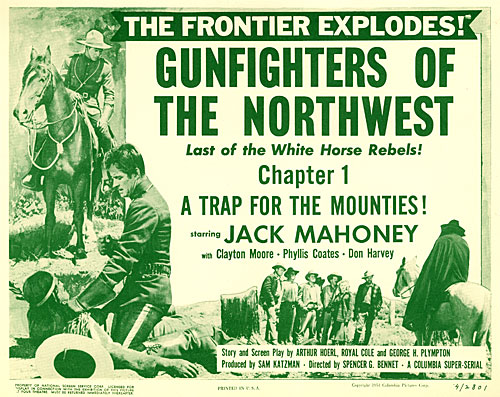
  OVERLAND PACIFIC (‘54 World/U.A.) When undercover railroad agent Mahoney is sent to investigate Indian trouble delaying the installation of track, he finds old buddy William Bishop at the bottom of the raids attempting to force the railroad to pass through property he owns so he may collect a small fortune. Tried and true B plot marred by some awfully stilted dialog. Color and cast keep it alive. Just seeing Peggie Castle in tight britches is reason enough to watch. She’s love interest for Bishop and Mahoney while Adele Jergens is a dance hall floozy jilted by Bishop. Terrific, memorable street fight between Mahoney and stuntman/actor Fred Graham. OVERLAND PACIFIC (‘54 World/U.A.) When undercover railroad agent Mahoney is sent to investigate Indian trouble delaying the installation of track, he finds old buddy William Bishop at the bottom of the raids attempting to force the railroad to pass through property he owns so he may collect a small fortune. Tried and true B plot marred by some awfully stilted dialog. Color and cast keep it alive. Just seeing Peggie Castle in tight britches is reason enough to watch. She’s love interest for Bishop and Mahoney while Adele Jergens is a dance hall floozy jilted by Bishop. Terrific, memorable street fight between Mahoney and stuntman/actor Fred Graham.
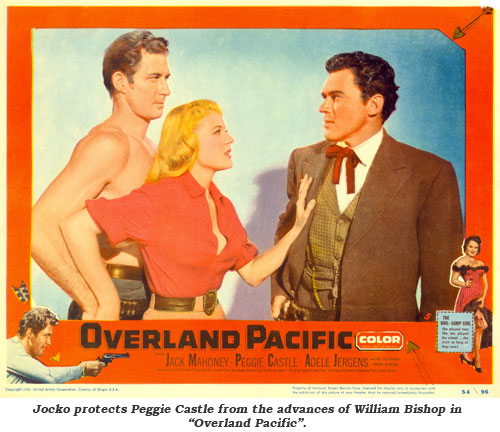
  A DAY OF FURY (‘56 Universal International) Originally titled “Jagade”, “A Day A DAY OF FURY (‘56 Universal International) Originally titled “Jagade”, “A Day 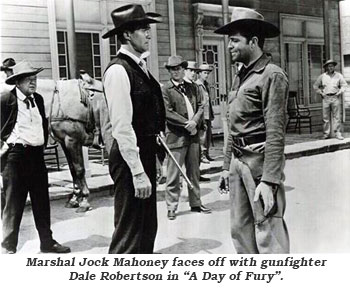 of Fury” is a solid western with an excellent characterization by Dale Robertson as gunfighter Jagade who realizes the day of the gunfighter has ended. After saving Marshal Mahoney’s life, gunman Robertson stops in Mahoney’s town only to find ex-girlfriend Mara Corday about to marry Mahoney. The jealous Robertson totally disrupts the peaceful town knowing Mahoney “owes him,” even going so far as to enlist the aid of cocky, gunfighter-admiring teenager Jan Merlin to stir up the townspeople to lynch Mahoney. Sharp, biting psychological western script. Mahoney was touted in advertising as “TV’s sensational ‘Range Rider’—now in a great new role” even though Mahoney’s series had ended three years earlier. of Fury” is a solid western with an excellent characterization by Dale Robertson as gunfighter Jagade who realizes the day of the gunfighter has ended. After saving Marshal Mahoney’s life, gunman Robertson stops in Mahoney’s town only to find ex-girlfriend Mara Corday about to marry Mahoney. The jealous Robertson totally disrupts the peaceful town knowing Mahoney “owes him,” even going so far as to enlist the aid of cocky, gunfighter-admiring teenager Jan Merlin to stir up the townspeople to lynch Mahoney. Sharp, biting psychological western script. Mahoney was touted in advertising as “TV’s sensational ‘Range Rider’—now in a great new role” even though Mahoney’s series had ended three years earlier.
  SHOWDOWN AT ABILENE (‘56 Universal-International) The showdown referred to turns out to be much more emotional than gunfight. When Jocko, the former sheriff of Abilene, returns home from the Civil War, he brings home more emotional baggage than he can carry. His girl, Martha Hyer, believing him dead, is now engaged to the town boss, Lyle Bettger, who lost his right hand in an accident caused by Mahoney years ago. Remade sheriff, Jocko is afraid to use a gun because he accidentally killed Bettger’s brother during the war. Mahoney feels a debt to Bettger and Bettger uses that to lay a guilt trip on Jocko. Mahoney does a credible job brooding over his myriad problems, but you expect more action from a Jocko western than you get. Remade, to no advantage, in ‘67 as “Gunfight in Abilene” with Bobby Darin. SHOWDOWN AT ABILENE (‘56 Universal-International) The showdown referred to turns out to be much more emotional than gunfight. When Jocko, the former sheriff of Abilene, returns home from the Civil War, he brings home more emotional baggage than he can carry. His girl, Martha Hyer, believing him dead, is now engaged to the town boss, Lyle Bettger, who lost his right hand in an accident caused by Mahoney years ago. Remade sheriff, Jocko is afraid to use a gun because he accidentally killed Bettger’s brother during the war. Mahoney feels a debt to Bettger and Bettger uses that to lay a guilt trip on Jocko. Mahoney does a credible job brooding over his myriad problems, but you expect more action from a Jocko western than you get. Remade, to no advantage, in ‘67 as “Gunfight in Abilene” with Bobby Darin.
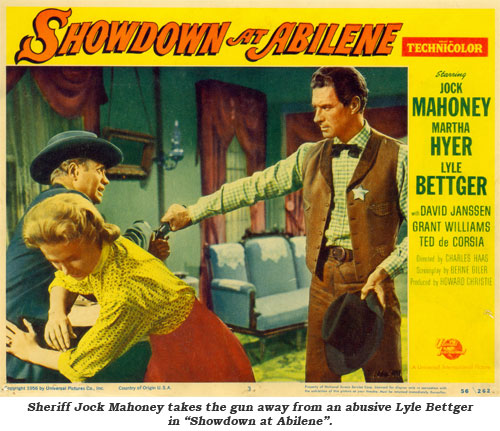
 JOE DAKOTA (‘57 Universal) A poor man’s “Bad Day at Black Rock” with striking plot similarities, though not nearly as well done as the Spencer Tracy film. Slow moving, Richard Bartlett’s direction never catches fire, receiving no help from the trite script by actor William Talman. Jocko arrives in a small town in search of an Indian who once served him in the Army as a scout. Discovering his old friend missing and the man’s land now being used for the discovery of oil, Mahoney starts asking questions, eventually learning unscrupulous oil speculators framed the dead man for the rape of a local girl in order to get the oil deposits on his land. JOE DAKOTA (‘57 Universal) A poor man’s “Bad Day at Black Rock” with striking plot similarities, though not nearly as well done as the Spencer Tracy film. Slow moving, Richard Bartlett’s direction never catches fire, receiving no help from the trite script by actor William Talman. Jocko arrives in a small town in search of an Indian who once served him in the Army as a scout. Discovering his old friend missing and the man’s land now being used for the discovery of oil, Mahoney starts asking questions, eventually learning unscrupulous oil speculators framed the dead man for the rape of a local girl in order to get the oil deposits on his land.
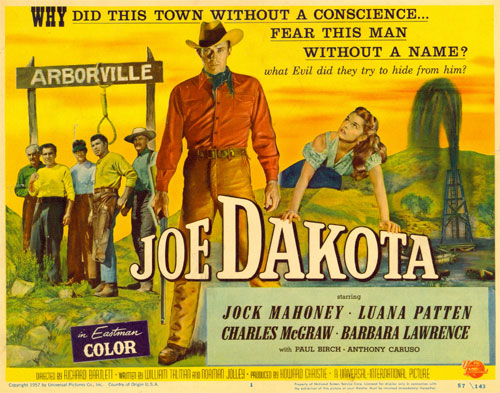
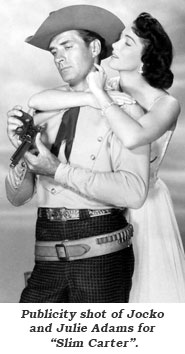   SLIM CARTER (‘57 Universal) Mahoney is an obnoxious, egotistical cowboy star who takes full advantage of his catapult to fame. When young Tim Hovey wins a contest with the reward of a month’s stay in Mahoney’s home, press agent Julie Adams finds her hands full trying to hide the real Mahoney from the boy. But the hero-worshiping lad manages to reform the heel. Jock’s real life wife Maggie is a hat check girl. SLIM CARTER (‘57 Universal) Mahoney is an obnoxious, egotistical cowboy star who takes full advantage of his catapult to fame. When young Tim Hovey wins a contest with the reward of a month’s stay in Mahoney’s home, press agent Julie Adams finds her hands full trying to hide the real Mahoney from the boy. But the hero-worshiping lad manages to reform the heel. Jock’s real life wife Maggie is a hat check girl.
ZERO LAST OF THE FAST GUNS (‘58 Universal) Gunslinger Mahoney is hired by an invalid millionaire to find his long lost brother who disappeared into Mexico 15 years ago. If he isn’t found, the invalid’s share of the business goes to his conniving partner. The partners’ gunman, Gilbert Roland, is determined to get control of the business, but can’t do it if the missing man is found. It’s a long, slow 81 minute trail. Made in Mexico with the feel of a Euro-spaghetti Western.
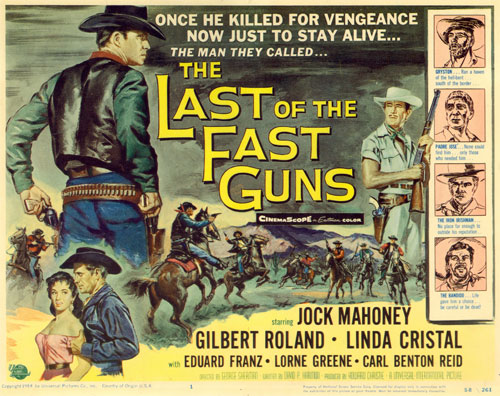
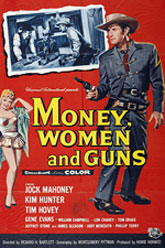  MONEY, WOMEN AND GUNS (‘58 Universal) Title of this tame affair promises far more than it delivers. Noted frontier detective Mahoney takes on the search for four heirs to the fortune of an old prospector who has been murdered by three gunmen. Along the way Mahoney meets and falls in love with Kim Hunter, mother of one of the heirs, youngster Tim Hovey. Quality cast but, due to the episodic nature of this screenplay, none of them is given enough screen time to make much of an impression. Title song, “Lonely Is the Hunter”, nicely sung by Jimmy Wakely. MONEY, WOMEN AND GUNS (‘58 Universal) Title of this tame affair promises far more than it delivers. Noted frontier detective Mahoney takes on the search for four heirs to the fortune of an old prospector who has been murdered by three gunmen. Along the way Mahoney meets and falls in love with Kim Hunter, mother of one of the heirs, youngster Tim Hovey. Quality cast but, due to the episodic nature of this screenplay, none of them is given enough screen time to make much of an impression. Title song, “Lonely Is the Hunter”, nicely sung by Jimmy Wakely.
From October ‘58 to June ‘59 Jock starred on TV as “Yancy Derringer”.
 CALIFORNIA (‘63 American International) Uninvolving early California western. Not up to Mahoney’s abilities with very little stuntwork so CALIFORNIA (‘63 American International) Uninvolving early California western. Not up to Mahoney’s abilities with very little stuntwork so
associated with Jocko. One fistfight and one dull sword duel. Made in the period when he was moving from stuntwork to pure acting. Allegedly based on the ‘46 Ray Milland film of the same name, this bears little resemblance unless you consider the idea the people of California want to break free of Mexico and join the Union—but that’s true of nearly all early California based titles.
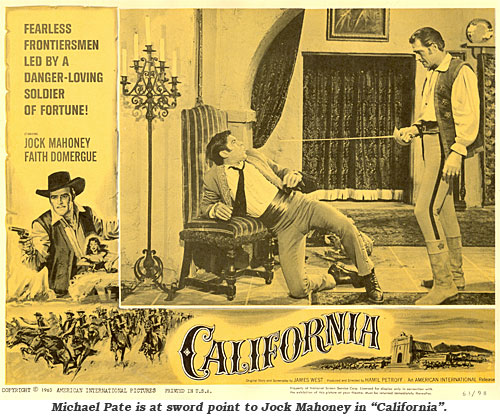
top of page |

